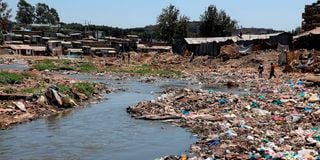Will CS Duale succeed where others failed? 18-month plan to restore Nairobi River

Waste dumped on a section of Nairobi River in this picture taken on September 15, 2024.
What you need to know:
- Duale says the biggest polluter is manufacturers (factories and industries) who don't want to abide by the law.
It is a task that has defeated many a minister. Regime after regime, task force after task force, cleaning up Nairobi River seems to be a hard job for successive environment officials. But Environment and Climate Change Cabinet Secretary Aden Duale says he is confident he will finally get it right. All he needs, he says, is just 18 months.
"Over the years, Nairobi River has suffered heavy pollution due to human activity, but I want to tell you that Kenyans will be able to drink clean water from it, just like the Thames in the United Kingdom," he said.
According to Mr Duale, the secret to cleaning up Nairobi River is enforcing the law.
"Soon, we will be installing cameras along that 47-kilometre stretch in partnership with the Korean government that will help catch those polluting the river."
The CS spoke in Nairobi during a consultative meeting with manufacturers. The meeting aimed to discuss the use of Extended Producer Responsibility (EPR) to clean up Nairobi's rivers.
A few weeks ago, he appeared in Parliament to answer questions on the state of Nairobi River. In response, he said the National Environment Management Authority did an assessment and found that at least 145 apartments and manufacturers along the river's waterway were the main culprits.
Biggest polluter
"The biggest polluter is manufacturers (factories and industries) who don't want to abide by the law. They do not have an effluent treatment plant (ETP). We will deal with them. The second biggest polluter of Nairobi River are the two big water and sewerage companies - Nairobi Water and Athi Water. Garbage disposal is also a key contributor," he told Members of Parliament.
In his meeting with manufacturers, The CS said producers cannot escape Extended Producer Responsibility.
"This means if we find traces of your product along Nairobi River, we will not look for the person who threw it there because the responsibility lies with the manufacturer of the product. That's the law,” he said.
EPR was amplified by the Kenya Plastic Action Plan launched in December 2019 by the Kenya Association of Manufacturers, where producers within the plastics sector committed to take responsibility for their products and waste but required a regulatory framework that mandates every producer and importer to be part of the EPR scheme.
It is a policy approach based on the 'Polluter-Pays Principle', whereby producers are given significant responsibility—financial, organisational, and/or physical—for the design, collection, treatment, and disposal of the waste from the products they introduce in the market.
CS Duale responded to concerns by manufacturers, who said they are against holding manufacturers being held accountable for pollution.
"Consumers should be held accountable for the pollution they cause either intentionally or because of ignorance," Bidco Africa Chief Executive Vimal Shah, said.
According to the Sustainable Waste Management Policy of 2021, every Kenyan generates about 0.5kg of waste daily, amounting to 25,000 tonnes for a population of 50 million Kenyans.
"This waste by composition is 60 per cent organic, 30 per cent recyclables and 10 per cent others," CS Duale said.
He added that earlier approaches to waste management in the country relied on a linear model of "take, make, dispose."
This resulted in littering, the creation of illegal dumpsites, resource wastage and increased greenhouse gas emissions.
"CS Duale, you came here in a Toyota, a fossil fuel-powered vehicle that has polluted the environment. No? Mr Shah posed. "For instance, if your vehicle knocked down someone on your way here, should we blame you or Toyota, the manufacturer? Was the manufacturer driving?" He asked the CS.
"Investigations will be done and the manufacturer may be found liable," CS Duale responded.
"Mr Shah, my business is enforcing the law, and you cannot push your responsibilities to the citizens. Of course we will talk to the citizens, which is why we have a programme for Nairobi River," the CS said.
"Section 13 (1) of the Sustainable Waste Management Act states that "every producer shall bear extended producer responsibility to reduce pollution and environmental impacts of the products they introduce into the Kenyan market and waste arising therefrom. Therefore, today, we called you here to remind you of your obligation to take responsibility for your product's environmental impacts. You all got a restoration order from Nema to clean up your waste in the Nairobi rivers. You must comply with the orders as directed and ensure that our rivers are spotlessly clean," he said.
In the meeting, manufacturers were tasked with providing evidence of compliance with the EPR laws or face consequences, which may include withdrawing the offending product from the market.





